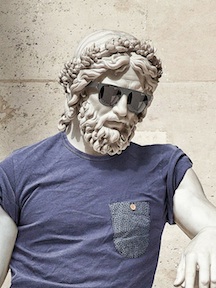By Sophie Lewis
Today, irony, at least in the popular culture realm, appears inescapable. We are constantly assailed by media through advertisements, artwork, literature, television, and film that all seems to vie for our collective attention while simultaneously reminding us not to take them so seriously. Nowadays, it seems that everything we experience requires a wry glance, a glib reaction, or a sarcastic one-line response.
In a 2012 New York Times article titled “How to Live Without Irony,” Christy Wampole describes our ironic age as a defensive strategy of action:
“No attack can be set against it, as it has already conquered itself. The ironic frame functions as a shield against criticism. The same goes for ironic living. Irony is the most self-defensive mode, as it allows a person to dodge responsibility for his or her choices, aesthetic and otherwise.”
Rather than risk rejection by an audience that is not as enthusiastic as it should be or the defeat of a project not achieving the desired results, the ironic protagonist is always able to retreat from disappointment. The old adage, “nothing ventured, nothing gained,” is quite appropriate, as the act of venturing is intrinsically sincere, and irony never explicitly acknowledges a direct desire for something gained.
But the ironic conception of cultural production has not extended to all areas of present society. The liberal arts, as an educational concept and as the identity of many of the United States’ institutions of higher learning, is one of the bastions of authenticity in our contemporary culture. In a world full of pop culture that is glorified for being bad, the liberal arts aspire to excellence through scholarly training and duty.
While the hipster generation is perpetually seeking out the next niche band, artist, or fashion trend in an attempt to leave behind the old, the liberal arts embraces history and preserves a catalogue of classic art, literature, and other forms of cultural expression.
The ironic mode of discourse is one that is purposefully ambiguous and offers a plethora of opportunities for hidden references; communicating in the humanities and social sciences is meant to be straightforward and clear, with an argument supported by evidence.
In many respects, the liberal arts represent a citadel of sincerity in a world of double-entendres and inside jokes. The humanistic disciplines, however, do share many similarities with ironic culture and hipsterdom.
Wampole describes the hipster as “a scholar of social forms, a student of cool. He studies relentlessly, foraging for what has yet to be found by the mainstream.” This description of a hipster does not sound too different from those who spend hours pouring over research in search of an original topic or studiously observe “social forms” in order to discern scholarly insights.
Similarly, satire is a well-celebrated and established genre in the history of the liberal arts and many a great writer has put his or her pen in service of the ironic voice in literature. The difference, however, is that the goal of ironic research and study is to negate and satirize preexisting culture, whereas the goal to which scholarly research aspires is to create something unique and satire can have, at its heart, the goal of promoting a sincere sentiment.
Matt Ashby and Brendan Carroll, a writer and a painter, respectively, argue in their 2014 piece for Salon, “David Foster Wallace Was Right: Irony is Ruining Our Culture,” that true scholarly and artistic production is necessarily sincere because it is motivated by a genuine desire to change and shape the world for the better. By contrast, ironic art is, according to Ashby and Carroll:
“Irony for irony’s sake. A smart aleck making bomb noises in front of a city in ruins. But irony without a purpose enables cynicism. It stops at disavowal and destruction, fearing strong conviction is a mark of simplicity and delusion.”
Although the liberal arts may share some superficial similarities with ironic culture and may even take on certain tropes of hipsterdom self-consciously, in the end the liberal arts are definitively non-ironic because their goal is to disseminate knowledge, rather than create and glorify cynicism.
As Ashby and Carroll conclude, “In poetry, in music, in painting, we can reimagine and plot coordinates into the unknown. We can take an honest look, rework and try again.” Poetry, music, painting, and other humanistic disciplines are fundamentally sincere and honest, and the liberal arts are the path that helps us to “reimagine and plot coordinates into the unknown” areas of our knowledge.
Sophie Lewis is senior at Barnard College majoring in Music and English. Barnard College of Columbia University is home to the Delta of New York chapter of Phi Beta Kappa.
Image by Leo Caillard; “Behold, Classical Greek Statues Dressed Up Like Hipsters” from Fast Code Deslgn.




